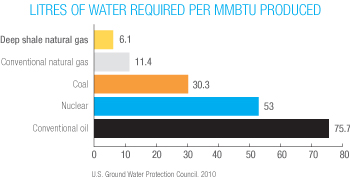Producing natural gas with hydraulic fracturing requires very little water compared to other energy sources. For example, shale gas production around the world, on average, requires less water than any other fossil fuel, and considerably less water than nuclear power.

The amount of water required to hydraulically fracture a well in Quebec will be about 13,000 cubic metres. This seems quite large, but for comparison, this is roughly equivalent to the amount of water that flows through the St. Lawrence River at Quebec City in one second. For further comparison, consider that the amount of water needed for natural gas production will be less than what Quebec currently uses for its car washes or golf courses!
What’s more, because hydraulic fracturing in deep shale takes place hundreds or even thousands of metres below the water table – separated by multiple layers of water-tight rock – the process does not threaten Quebec’s drinking water supplies.
